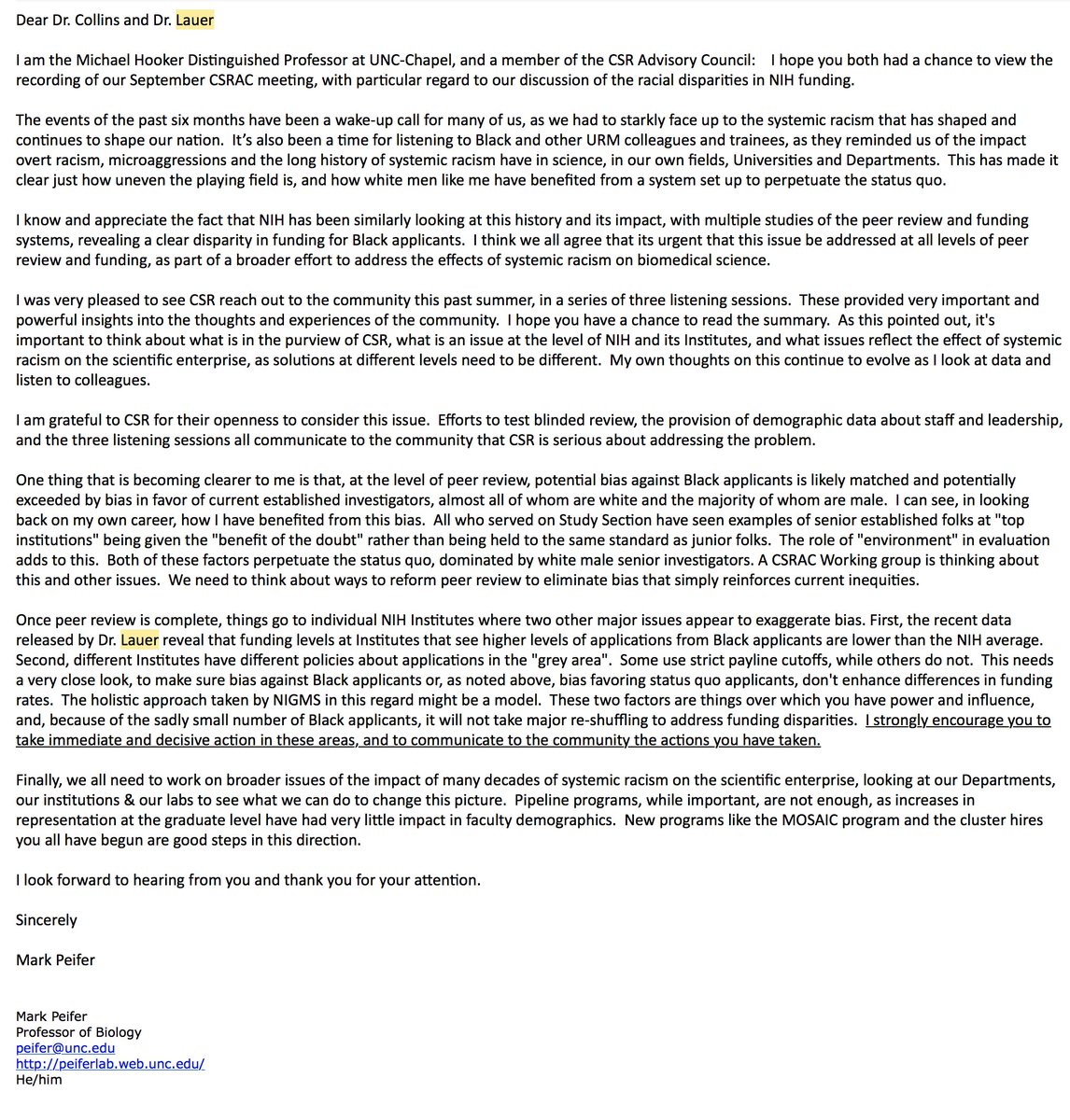Dear Dr. Collins @NIHDirector and Dr. Lauer @NIHgrants --I am a member of the @CSRpeerreview Advisory Council. A week has passed since I sent the letter below to each of you and I am still awaiting a response 1/21
The events of the past six months have been a wake-up call for many of us, as we had to starkly face up to the systemic racism that has shaped and continues to shape our nation. 2/21
It’s also been a time for listening to Black and other URM colleagues and trainees, as they reminded us of the impact overt racism, microaggressions and the long history of systemic racism have in science, in our own fields, Universities and Departments. 3/21
This has made it clear just how uneven the playing field is, & how white men like me benefit from a system set up to perpetuate the status quo. At our September CSRAC meeting we heard an update from Dr. Byrnes and her staff on racial disparities in NIH funding. 4/21
I know and appreciate the fact that NIH has been similarly looking at this history and its impact, with multiple studies of the peer review and funding systems, revealing a clear disparity in funding for Black applicants. 5/21
I think we all agree that its urgent that this issue be addressed at all levels of peer review and funding, as part of a broader effort to address the effects of systemic racism on biomedical science. 6/21
I was very pleased to see @CSRpeerreview reach out to the community this past summer, in a series of three listening sessions. These provided very important and powerful insights into the thoughts and experiences of the community 7/21
https://public.csr.nih.gov/sites/default/files/2020-09/CSR_July_2020_Racial_Disparities_in_Funding_comment_summary.pdf">https://public.csr.nih.gov/sites/def...
https://public.csr.nih.gov/sites/default/files/2020-09/CSR_July_2020_Racial_Disparities_in_Funding_comment_summary.pdf">https://public.csr.nih.gov/sites/def...
It& #39;s important to think about what is in the purview of CSR, what is an issue at the level of NIH and its Institutes, and what issues reflect the effect of systemic racism on the scientific enterprise, as solutions at different levels need to be different. 8/21
I am grateful to CSR for their openness to consider this issue. Efforts to test blinded review, the provision of demographic data about staff and leadership, and the three listening sessions all communicate to the community that CSR is serious about addressing the problem. 9/21
One thing that is becoming clearer to me is that, at the level of peer review, bias against Black applicants is likely matched & potentially exceeded by bias in favor of current established investigators, almost all of whom are white and the majority of whom are male. 10/21
I can see in looking back on my own career how I benefited from this bias. All who serve on Study Section have seen examples of senior established folks at "top institutions" being given the "benefit of the doubt" rather than being held to the same standard as junior folks 11/21
The role of "environment" in evaluation adds to this. Both of these factors perpetuate the status quo, dominated by white male senior investigators. A CSRAC Working group is thinking how we reform peer review to eliminate bias that simply reinforces current inequities. 12/21
Once peer review is complete, things go to NIH Institutes where two other major issues exaggerate bias. 13/21
First, recent data from Dr. Lauer @NIHgrants reveal that funding levels at Institutes that see higher levels of applications from Black applicants are lower than the NIH average. 14/21 https://nexus.od.nih.gov/all/2020/08/12/institute-and-center-award-rates-and-funding-disparities/">https://nexus.od.nih.gov/all/2020/...
Second, different Institutes have different policies about applications in the "grey area". Some use strict payline cutoffs, while others do not. This needs a very close look... 15/21
to make sure bias against Black applicants or, as noted above, bias favoring status quo applicants, don& #39;t enhance differences in funding rates. The holistic approach taken by @NIGMSgenes in this regard might be a model. 16/21
These two factors are things over which you have power and influence, and, because of the sadly small number of Black applicants, it will not take major re-shuffling to address funding disparities. 17/21
I strongly encourage you to take immediate and decisive action in these areas, and to communicate to the community the actions you have taken. 18/21
Finally, we all need to work on broader issues of the impact of many decades of systemic racism on the scientific enterprise, looking at our Departments, our institutions & our labs to see what we can do to change this picture. 19/21
Pipeline programs, while important, are not enough, as increases in representation at the graduate level have had very little impact in faculty demographics. New programs like the MOSAIC program and the cluster hires you all have begun are good steps in this direction. 20/21
I look forward to hearing from you and thank you for your attention. 21/21

 Read on Twitter
Read on Twitter


